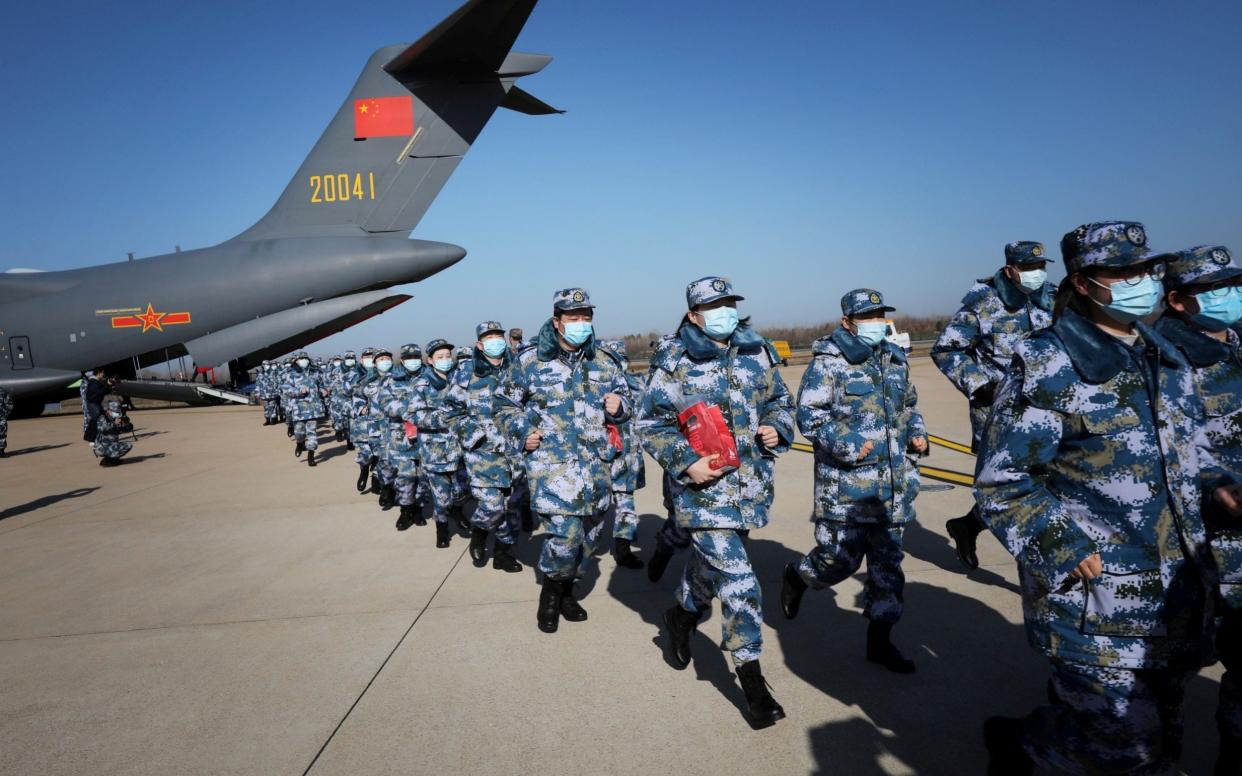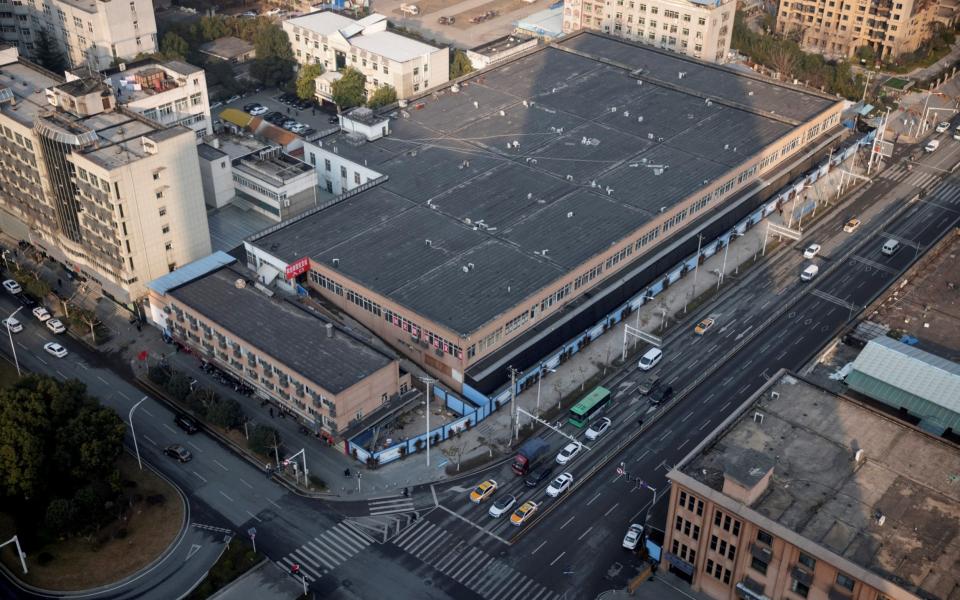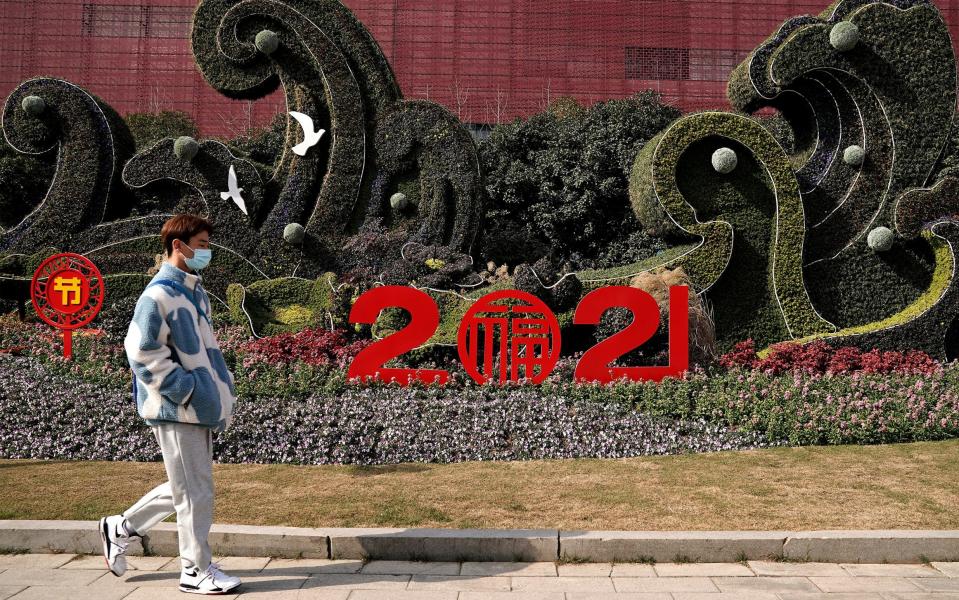China is using 'lavish' PPE contributions to quash concerns about Covid-19 origins, Defence Select Committee chief warns

China is using "lavish" PPE contributions to try and quash concerns about the origins of Covid-19, the Defence Select Committee chief has warned.
The delay in allowing WHO inspectors into China has allowed space for a “ferocious internal propaganda campaign” suggesting the US military is to blame for planting the virus, say Tobias Ellwood and chemical and biological weapons-expert Hamish de Bretton Gordon.
Chinese handling of the crisis has been characterised by “denial, hesitation, cover up, refusal of outside help and punishment for all who dare speak out,” they told the Telegraph.
“Any international voices of concern have been quashed with lavish and sizable contributions of PPE and more recently vaccination programmes.”
China defended its handling of the coronavirus pandemic on Tuesday, saying the hard lockdown on Wuhan weeks after the virus was detected had "reduced infections and deaths". Foreign ministry spokeswoman Hua Chunying said the country would "strive to do better".

Having arrived in Wuhan City the WHO team, now held in quarantine, are conducting their investigation by zoom.
They may eventually get to visit the wet market, now closed down, considered by many to be the source of the virus. However, the team is unlikely to be allowed to visit the Chinese Centre for Disease Control (CCDC), a state-run facility located less than a quarter of a mile away.
The CCDC has conducted studies on bats with coronavirus at lower protection levels than the most secure research facilities.
The defence experts say it would be irresponsible to suggest the source of the pandemic was an error in a Chinese military biological weapons programme, “but until it is ruled out the possibility remains very real and is a reality check for the West”.
“Pandemics can no longer be written off as once- in-a-century anomalies.
“Advances in technology have meant many civilian medical research projects have the potential to be used in military applications,” they say.
Biosecurity protocols are not adequate enough to prevent dangerous biological materials accidentally escaping or falling into the hands of malevolent parties.
Mr de Bretton-Gordon says the world must have a monitoring and enforcement system for biological weapons, similar to the existing regime for chemical weapons.
“Preparation for a future pandemic or biological terror event should begin immediately with a review of existing - and woefully unenforceable - international conventions,” he says.

The call comes as leading security experts warn of the “weaponisation” of the coronavirus vaccine.
David Gordon of the International Institute for Strategic Studies (IISS) says China will seek to “regain lost momentum through vaccine diplomacy” after the disastrous early handling of the pandemic.
“China can get vaccines out to a lot of the places in the world that otherwise would not be getting them,” he told the Telegraph.
“China views the vaccine as a soft power tool and is unlikely to attach strings directly. Instead they will frame it as part of the competition over systems and use it to distinguish them from the Americans.
“China has competed with the US, Europe, other countries for a long time, but it's only really in the post Covid period that they began to make more explicitly this notion of the superiority of their system.
“I believe in the next several weeks you will have a substantial announcement by China on a commitment of a big volume of vaccines for export.”
Nigel Gould-Davies, also of the IISS, says the pandemic has intersected with international politics and aggravated some of the fault lines already there.
“Covid is like an alien invasion, it has invaded the human race. No one is better off if the invader wins so there's a slam dunk case for cooperating against it. Yet, that hasn't really happened.”
He says the underlying theme of his think-tank’s strategic survey, published last November, is the worrying mismatch between the demand and supply of international cooperation.
“It is the biggest cooperation gap since World War Two.”
Dispute over the origins of the virus are “politically and diplomatically a source of very significant division," he says.
COMMENT from Rt Hon Tobias Ellwood MP Chair of the Defence Select Committee and Hamish de Bretton-Gordon OBE RE(V)
Hamish de Bretton-Gordon is a world leading expert in Chemical and Biological weapons and Bio Security. He is the Distinguished Visiting Fellow at Magdalene College Cambridge 20/21.
“In the future, we should think of weaponized biology as no less of an existential threat to the planet in the 21st Century than weaponized atomic science to the 20th’’.
In the award-winning box set ‘Chernobyl’ a reluctant nuclear engineer was sent to visually inspect reactor four’s protective dome and determine the scale of the explosion.
His claim that the core was exposed was quickly dismissed and the incident downplayed. It took radiation levels in Sweden to spike before the Soviets admitted both it and the West had a major problem.
The Chernobyl analogy with COVID-19 is now a familiar one. Denial, hesitation, cover up, refusal of outside help and punishment for all who dare speak out. Whilst the West is left to gradually put the pieces of the truth jigsaw together.
This is where the parallels end.
China has learnt lessons from Chernobyl making its own response to this latest international disaster all the more sinister.
Gorbachev described the 1986 reactor disaster as a turning point of a when broken and distorted system, built on fear, lies, patronage and totalitarian ideology was finally laid bare. Communism is an organised lie. It’s about control of information and a hierarchy based around a single party which uses fear to retain its monopoly of power - at all costs. Truth is whatever the Party chooses to make it.
Hence only after a full year following China’s own ‘Chernobyl’ is an international team of health inspectors finally allowed to visit this new ground zero.
The delay has allowed space for a ferocious internal propaganda campaign to convince many Chinese that the US military is to blame for planting the virus. And any international voices of concern have been quashed with lavish and sizable contributions of PPE and more recently vaccination programmes.
Having arrived in Wuhan City the WHO team are now held in quarantine - conducting their investigation by zoom. They may eventually get to visit the wet market, now closed down, but they will not be allowed to visit the Wuhan Institute of Virology (WIR)which coincidently studies bats with coronavirus.
Speculation on the role of the WIR has moved to accusation. It would be irresponsible to suggest the source of this pandemic was an error in a Chinese military biological weapons programme. But until it is ruled out the possibility remains very real and is a reality check for the West.
The character of conflict is changing rapidly, and we are quickly awakening to threats in the cyber and space domains.
But to date, bio security has been the poor relation of the new dangers which are emerging beneath the threshold of direct, open conflict. Yet with two million deaths across the world and national responses continuing to batter economies, no country can afford to ignore what exactly happened in Wuhan. And no country harbouring such an outbreak has a right to close its borders to international scrutiny.
Pandemics can no longer be written off as once- in-a-century anomalies.
Like the advent of the atomic bomb, we must come to terms with their very real threat and develop the necessary global standards to limit or remove the possibility of their proliferation.
Advances in technology have meant that many civilian research projects in medicine have the potential to be used in military applications (dual-use research) and biosecurity protocols are not adequate enough to prevent dangerous biological materials from falling into the hands of malevolent parties.
The lost four weeks China chose to hide the pandemic, back in December 2019, could have saved thousands of lives and limited the consequent economic devastation. This cannot be allowed to happen again.
Whether deliberately or unintentionally- released by a state or non- state actor – the collective global response must be swift and decisive – even if the next ground zero is in an uncooperative state.
Preparation for a future pandemic or biological terror event should begin immediately with review of existing (and woefully unenforceable) international conventions.
If all this seems dramatic, we should recognise how COVID-19 itself has mutated into a more resilient improved form of itself. The next pathogen may just as transmittable but as deadly as ebola.
It’s time to take bio security seriously – perhaps one for Britain to put on the G7 agenda.

